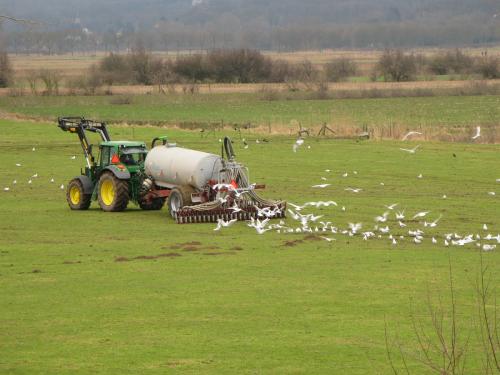Domestic agriculture provides most of our food consumption and contributes to export revenues and rural livelihoods. At the same time, it is a key sector where management and production changes can reduce pressure on the environment, including air, water, climate and biodiversity.
More efficient and better targeted use of nutrients both in crop and livestock production has positive impacts on a range of policy outcomes in the UK, as has been highlighted in policies for climate change mitigation and adaptation, biodiversity, circular economy, competitiveness and public health.
Approach
Despite the complex interactions between nutrient management, food production and sustainability goals, both research and policy still remain fragmented, with few attempts to address systemic effects and identify interventions which enhance the synergies and reduce the trade-offs.
To this end in 2020, the Department for Environment, Food & Rural Affairs (Defra) have commissioned a group including agricultural policy experts, agronomists, scientists, and economists, to make recommendations on nutrient policy development.
The group met regularly over an 18-month period, and working together with Defra, highlighted and summarised the key scientific, social and policy implications of nutrient management in agriculture.
The report from the Nutrient Management Expert Group (NMEG), which contains the detailed assessment of the key policy areas (air quality, water quality, soil health, circular economy and climate change) and 15 recommendations, has been published earlier this year.
Policy needs
Farmers and agri-food stakeholders have made progress in recent decades in reducing the environmental burden, especially when considering the increase in food production. However, strong further actions are needed, and for that a coherent set of policies need to be in place.
Both production and food system changes can contribute to reducing environmental pressures from nutrient management. Opportunities on farms include better organic and synthetic nutrient planning and application, increasing the utilisation of organic materials, manure treatment, storage and application technologies, practices to improve soil health. Catchment-scale measures, like targeted agroforestry, afforestation and buffer areas can also improve environmental outcomes. Finally, transitioning the food system towards healthier and more balanced human nutrition offers significant opportunities to achieve multiple environmental and health goals.
A dynamic set of coherent policies with long-term goals and clear transition pathways are needed to achieve these goals. They would combine regulatory change, incentives and opportunities for learning and innovation.
Policies need to be co-designed with stakeholders, including target setting, practice, policy changes and monitoring. Considerations for local challenges, both societal (e.g. rural areas) and environmental (e.g. sensitive habitats, water quality) need to be reflected in the solutions.
As wider and deeper change is required than achieved so far, both more ambitious interpretation of “best practice” and more radical shifts and structural change across the food chain (production, supply chain and consumption) are essential. At the same time, responsible land managers require support, both in investment (leveraging private sources besides public money) and in impartial, reliable and trusted advice and guidance delivered by accredited advisors and decision support tools.
Policy approaches need to balance holistically our demand on land use and nutrients, ensuring food, water and energy security. The environmental impacts need to be considered together to avoid pollution swapping or “exporting” emissions by not balancing any reduction in food production with a change in food demand.
The joint-up policy must be adaptable and applicable to a range of present and future environmental conditions, farming systems and societal needs. A cornerstone of such adaptability is the farm-, catchment and national level monitoring of environmental conditions (air, water, soil, greenhouse gases) and farm performance.
Overall recommendations
With the above policy needs in mind, the NMEG recommends these policy interventions for consideration to complement existing policies in Scotland and wider UK:
- The development of a national Nutrient Management Strategy
- Nutrient budgeting at farm, catchment, regional and national scales
- Long-term, regular soil monitoring on all farms (e.g. part of a soil health passport scheme)
- Spatial targeting, with limits, to reduce excessive nutrient loads to areas with sensitive terrestrial, freshwater and marine habitats
- Adequate and timely water quality monitoring
- Partnership approaches between farmers, advisers, researchers and policy makers (local and regional scale) to build trust, monitor progress and co-design targets
- Financial support for farms in investment in technologies improving the efficient use of nutrients and the reduction in nutrient losses
- Linking to existing private initiatives, for example water industry nutrient trading schemes
The NMEG report emphasises the importance of holistic policy approaches, considering all relevant social and environmental outcomes, with stronger harmonisation between policy areas. Timely implementation of these recommendations at national, regional and local level would provide significant societal benefits to the UK and its devolved administrations.
Written by Vera Eory, SRUC
